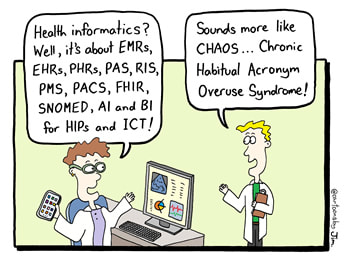What would you do? Burst into tears? Swear profusely? Run screaming to the nearest pub? Sing a jolly pop song?
|
What do you do when the proverbial stool sample hits the rotary ventilation device and ALL your IT stops working, yep all of it, all at once!? What happens when the laboratory computer system locks everyone out and you can’t put results in or look results up? What can you do when the fancy piece of automation that moves agar plates around the lab like some kind of daemonic sushi bar fails because of a power cut?
What would you do? Burst into tears? Swear profusely? Run screaming to the nearest pub? Sing a jolly pop song? Doctors love acronyms; they use them all the time. They’re bad enough when they’re talking:
I’ve had to reduce the amount of time I spend watching the news as it’s really not good for my mental health. Not only that, but ECIC is getting increasingly irritated with me muttering and grumbling at the various Covid-19 stories, and she’s right, I should “just let it go”.
One (of the many) things that irritates me is when someone says a new variant is “more transmissible”. Why does it irritate me? Well, it’s an incorrect term. Transmissible means “being able to be spread from one person to another”, well we know SARS CoV2 is transmissible… but it cannot be “more transmissible”, it is either transmissible or it is not. More transmissible would mean that it was better able to “move” from one person to another and we have no evidence of that at all… it hasn’t suddenly sprouted wings! Okay, I’m not talking about the X-men, Wolverine, Rogue and Professor Xavier, let’s talk about mutations in viruses instead; Omicron is one such mutant…has anyone else noticed Omicron is an anagram of “moronic”? (Just me then hey!).
There’s a story playing out over the news channels that is causing me some distress. There is an alpaca on death row who has tested positive for tuberculosis (TB) and therefore been sentenced to be culled as he poses a risk to other animals… He’s called Geronimo and he’s cute!
I have been asked this question a lot recently… maybe people are tired of being on the frontline and they want to escape to a quieter environment or do something else… you are not alone either, quite a few of our friends and colleagues from overseas have also asked. Maybe it’s the impression I give that I have my feet up on my desk, take too many tea breaks or have the time to go and hunt for a box of hospital chocolates to raid!?
It is a common mistake to think that if you pass the right exams you can become a Clinical Microbiologist; it isn’t that simple. Believe it or not, passing the exams is the easy bit! But before we get into all-of-that let me just tell you what a Clinical Microbiologist does… although if you ask the ECIC she’ll just say “drink coffee and eat cake!” Bats are getting a hard time at the moment. They seem to be being blamed for all of the infections threatening our species, from Ebola, Marburg, Rabies, Nipah, Hendra and now SARS Cov2. The name for these animal-related human infections is zoonoses. I can just imagine the bats cringing every time the news comes on wondering what they’re going to be blamed for next.
You have to admit, it’s not great PR to be associated with the scariest viruses known to cause deadly human infections. But is this fair? Are bats really MORE likely to be the source of infections in humans? Do bats harbour more nasty viruses than other animals? Or are they just getting a bad press and we should cut them some slack? As the saying goes, “there ain’t no flies on us, there ain’t no flies on us, there may be flies on some of you guys but there ain’t no flies on us!”
I had a great question last week from Michael Kamdar who asked me “if a healthcare professional who works within a hospital would have the flora of that of a normal person within the community or within a hospital?” Great question! And although I have no specific resources I can comment from experience… Firstly let’s go over the normal flora of non-hospitalised people. "Why do we give broad spectrum antibiotics like Benzylpeniciilin, Gentamicin and Metronidazole to babies with necrotising enterocolitis [NEC] when their gut is sterile?" asked the Neonatal Unit [NNU] Registrar.
It was the middle of the NNU multidisciplinary ward round. "Pardon?" said the Microbiologist, caught red-handed reaching for a second chocolate biscuit and suddenly feeling self-conscious as everyone turned to stare at him. "Babies are born with a sterile gut so when they develop NEC why do they need antibiotics; surely there are no bacteria to cause a problem". The Registrar restated his question again but with more clarity. The Microbiologist recognised the question was being rephrased; he obviously looked like he did not understand what was being asked! It was actually a very good observation of the Microbiologist! But it was an even better question thought the Microbiologist…so it needed a good answer… Fortunately the Microbiologist was on the ball, and in fact was armed with the latest research provided by the NNU Pharmacist only a few weeks earlier. Hopefully everyone knows where babies come from... but do you know where babies gut bacteria come from? Read on... There are lots of sayings in medicine, often recited by grumpy old doctors like me, to remind more junior staff how medicine “works”, or once worked!! Sayings like “if you hear hooves, think horses”, “common things are common” or “as rare as hen’s teeth”. All of these mean that a patient’s symptoms are usually explained by a common disease rather than a rare one and that treatment and investigations should be targeted at the common diagnoses rather than something more obscure.
Note: those doing exams are often the worst offenders as they are cramming obscure knowledge in order to cover “everything possible” that an exam might test them on, even if it is as rare as hens teeth! But why do we say this? What is wrong with sending every test you can possibly think of for every possible disease, however rare, that might explain the patient’s symptoms? How do Doctors choose what tests to perform and have you ever considered how reliable the results that come back are!? You might be shocked to know that not all tests are completely accurate. Okay, bear with me on this. The science is complicated and involves statistics… (stay with me everyone!!!) but it’s a fundamental part of medicine so I’m going to stick with it, come on, come with me… there is a “are you still confused” recap at the end, honest you will get it, Editor-Chief-in-Charge wrote it and she doesn’t do stats! |
Facebook has deleted the Microbiology Nuts & Bolts pages - if you want your weekly dose of microbiology then you will need to come here, and we look forward to you continuing to read it!
Blog Author:
David Garner Please DO NOT advertise products and conferences on our website or blog
Categories
All
Archives
November 2022
Categories
All
|








 RSS Feed
RSS Feed
